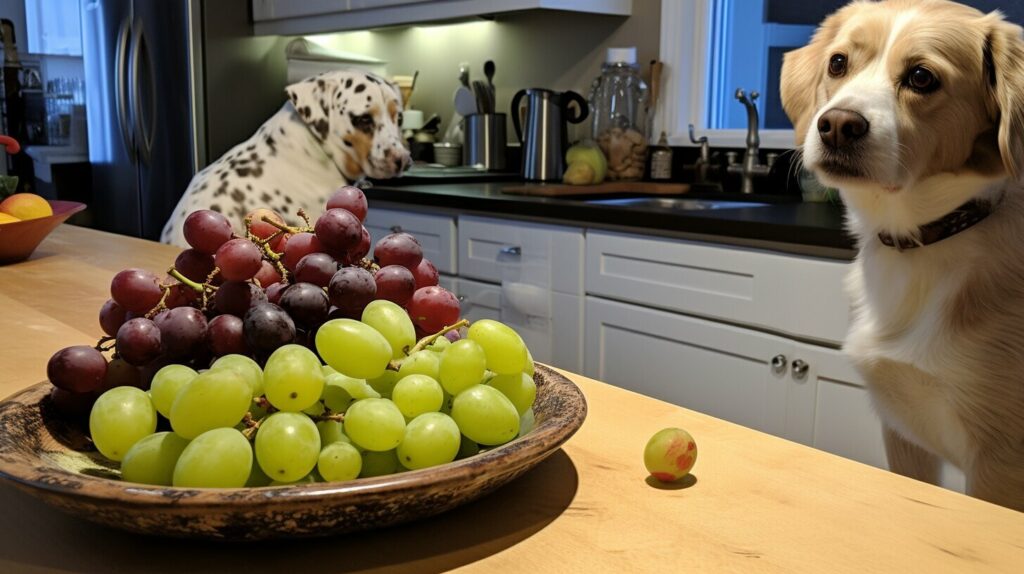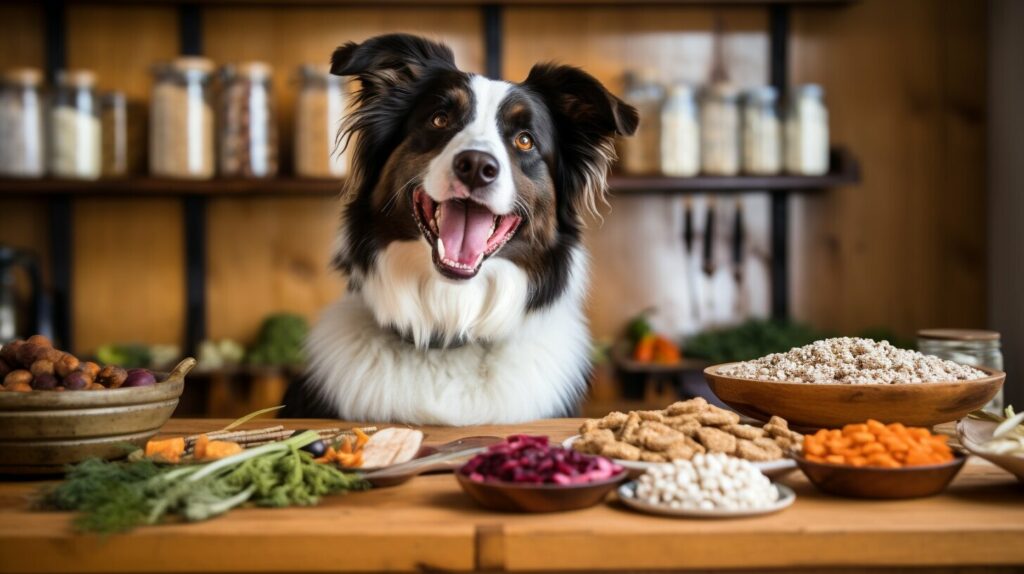If you’re a dog owner, you may have wondered whether grapes are a safe treat for your furry friend. While grapes may be a delicious snack for humans, it’s important to know that they can pose a potential threat to your pet’s health.
In this section, we will explore the question of whether dogs can safely consume grapes. We’ll also highlight the potential risks associated with feeding grapes to your dog and the importance of understanding grape toxicity.
Key Takeaways:
- Grapes should not be fed to dogs as they can be toxic to their health
- Understanding the potential effects of grapes on dogs is crucial for pet owners
- If you suspect your dog has ingested grapes, it is important to seek veterinary assistance immediately
Understanding the Effects of Grapes on Dogs
Dogs are loving, faithful companions and deserve the very best from their owners. However, when it comes to their diet, it’s crucial to understand the potential effects of certain foods, including grapes, on their health.
While some foods may be harmless to humans, they can be toxic to dogs. Grapes are a prime example of this. The effects of grapes on dogs can be severe, often leading to acute kidney failure. It’s therefore essential to avoid feeding grapes to your furry friend.
But are grapes toxic to dogs? The answer is yes, they are. Even a small amount of grapes can cause serious health issues for your dog. Grape toxicity in dogs can occur within a few hours of ingestion, and the symptoms may vary from vomiting and diarrhea to lethargy and loss of appetite.
If you’re wondering, “can dogs have grapes at all?” the answer is a straightforward no. It’s best to play it safe and avoid feeding grapes to your dog altogether.
The compounds present in grapes that cause toxicity in dogs are still unknown, and some dogs may be more susceptible than others. Therefore, it’s not worth taking any chances with your pet’s health.
Now that you understand the effects of grapes on dogs, it’s time to explore the specific dangers associated with grape consumption for dogs, which we will cover in the following section.
The Dangers of Dogs Eating Grapes
Grapes are a common household food item that can pose a significant risk to your dog’s health if ingested. The dangers of dogs eating grapes are related to their toxicity and can lead to severe health issues.
Canine health can be severely impacted by grape consumption, and it’s essential to understand the potential risks involved. Grape toxicity can affect dogs of any breed or age, and the negative impact on their health can be devastating.
| Dangers of Dogs Eating Grapes | Effects on Canine Health |
|---|---|
| Upset stomach | Kidney failure |
| Vomiting | Dehydration |
| Diarrhea | Loss of appetite |
| Increased thirst | Abdominal pain |
If you suspect your dog has ingested grapes, immediate action is necessary. The risks associated with grape toxicity can escalate quickly, and your dog’s health can deteriorate rapidly. It is essential to seek veterinary assistance promptly.
As a responsible pet owner, it’s imperative to prioritize your dog’s health and well-being. Avoid feeding them grapes and ensure that any grape-containing products are stored out of their reach. Additionally, educate others on the potential dangers of feeding grapes to their pets, increasing awareness about grape toxicity in dogs.
Signs and Symptoms of Grape Toxicity in Dogs
It’s essential to be aware of the signs and symptoms of grape toxicity in dogs, so you can seek veterinary assistance promptly. If your dog has ingested grapes, watch out for the following:
- Vomiting and diarrhea
- Lethargy and weakness
- Loss of appetite
- Abdominal pain and discomfort
- Dehydration
- Decreased urination
- Acute kidney failure
If you suspect that your dog has consumed grapes, act quickly. Symptoms may occur within hours of consumption or take up to a few days to manifest. Contact your veterinarian immediately and provide as much detail as possible, including the amount of grapes your dog consumed, the time frame of ingestion, and any observed symptoms.
Expert Advice: Can Dogs Eat Grapes?
As a responsible dog owner, you may be wondering if grapes are safe to include in your pet’s diet. According to veterinary experts, the answer is a resounding no.
Grapes, along with their dried variant, raisins, have been linked to acute kidney failure in dogs, which can have serious long-term consequences on their health.
If you suspect that your dog has ingested grapes, it is essential to seek veterinary attention immediately, even if they are not showing any visible symptoms of grape toxicity.
The best course of action is to avoid feeding your dog grapes altogether and opting instead for safe and healthy alternatives that they can enjoy without risking their health.
So, can dogs have grapes? The short answer is no. Keep your furry friend safe by steering clear of grapes and raisins, and consulting with your veterinarian for proper nutritional guidance.
Alternatives to Grapes for Dogs
While grapes may be a favorite fruit for many, they pose a significant risk to your furry friend’s health. Fortunately, there are several safe alternatives that you can incorporate into your dog’s diet to satisfy their sweet tooth. These alternatives provide a healthy and nutritious treat for your pet without the risk of toxicity from grapes.
Fruits
Some safe and healthy fruit alternatives to grapes for your dog include:
- Apples: Apples are a great source of vitamins A and C, fiber, and antioxidants. They are also low in protein and fat, making them an excellent snack for dogs.
- Bananas: Bananas are a good source of potassium and carbohydrates, providing a great energy boost for your dog.
- Blueberries: Blueberries are rich in antioxidants and fiber, helping improve your dog’s digestion and immune system.
- Watermelon: Watermelon is an excellent source of hydration for your dog during hot summer days. It also contains vitamins A and C and is low in calories, making it an ideal snack for dogs.
Vegetables
Vegetables are another great source of vitamins and minerals for your dog. Some safe vegetable alternatives to grapes include:
- Carrots: Rich in vitamins A, C, and K, carrots are an excellent low-calorie snack for dogs. They are also great for dental health, helping to clean your dog’s teeth and freshen their breath.
- Pumpkin: Pumpkin is rich in fiber and helps improve your dog’s digestion. It is also a great source of vitamin A and can promote healthy skin and coat.
- Sweet Potatoes: Sweet potatoes are an excellent source of vitamin A, C, and fiber. They are low in fat and calories, making them a healthy treat for your furry friend.
When feeding your dog fruits and vegetables, remember to remove any seeds or pits and cut them into small pieces to prevent choking. Additionally, always introduce new foods gradually and in moderation to avoid any digestive issues.
Ensuring Your Dog’s Health and Well-being
As a responsible pet owner, your priority is ensuring your dog’s health and well-being. Apart from ensuring a balanced diet, there are several other factors to consider to keep your pet healthy and happy. Here are some essential tips:
Regular Veterinary Check-Ups
Regular check-ups with your veterinarian are essential to ensure your dog’s overall health. Your vet will be able to detect potential health issues early on and provide appropriate treatment. It is recommended to schedule annual check-ups for adult dogs and twice-yearly visits for senior dogs.
Appropriate Exercise
Just like humans, dogs require regular exercise to stay healthy. Daily walks, playtime, and other physical activities can help maintain your dog’s physical and mental well-being. The amount and type of exercise required depend on the breed, age, and overall health of your dog. Consult with your veterinarian to determine the appropriate exercise regimen for your pet.
A Balanced Diet
Your dog’s diet plays a significant role in their health. It’s essential to provide them with a balanced diet consisting of all the necessary nutrients and vitamins they need. Avoid giving them human food that can be harmful or toxic to their health, such as grapes. Instead, choose dog-friendly foods that are both nutritious and safe for consumption.
Keeping Grapes and Grape-Containing Products Out of Reach
Prevention is key when it comes to grape-related accidents. Ensure grapes, raisins, and other grape-containing products are kept out of your dog’s reach. Store them in a secure place or in a sealed container to avoid accidental ingestion. If you suspect your dog has consumed grapes or grape-containing products, seek veterinary assistance immediately.
Conclusion
Ensuring your dog’s health and well-being is vital as a pet owner. Regular veterinary check-ups, appropriate exercise, a balanced diet, and preventing grape-related accidents are crucial to maintain your dog’s overall health. Remember, your furry friend depends on you for their well-being, so always prioritize their health.
Educating Others: Spreading Awareness about Grape Toxicity
As a responsible dog owner, it’s crucial to spread awareness about the potential dangers of feeding grapes to dogs. Grape toxicity in dogs can lead to severe health issues and even be fatal. By educating others, including fellow dog owners, you can help prevent grape-related accidents and keep dogs safe.
How to Spread Awareness
There are several ways you can effectively spread awareness about grape toxicity in dogs:
- Share this information on your social media platforms, including Facebook, Twitter, and Instagram.
- Talk to other dog owners in your community, including at the dog park or during walks.
- Collaborate with local animal shelters or rescue organizations to raise awareness about grape toxicity.
- Provide informational handouts or flyers at pet stores or veterinary clinics.
By taking these steps, you can help ensure that more dog owners are aware of the dangers of grapes and are taking the necessary precautions to keep their pets safe.
Why it’s Important to Spread Awareness
Grape toxicity in dogs can be a serious issue that pet owners might not be aware of. By spreading awareness, you can help prevent unnecessary suffering and possibly save a dog’s life. Additionally, by raising awareness, you can help prevent pet owners from unintentionally putting their dog’s health at risk by feeding them grapes or grape-containing products.
The more people who are aware of the potential dangers of grapes for dogs, the more we can help ensure that dogs are not needlessly exposed to this toxic fruit.
Canine Health: Preventing Grape-Related Accidents
Grape toxicity can have severe consequences on your dog’s health. As a responsible pet owner, it’s crucial to take preventative measures to ensure your furry friend is safe from accidental grape ingestion.
Here are some tips to prevent grape-related accidents:
- Avoid keeping grapes and grape-containing products in areas that your dog can easily access.
- Make sure to store grapes and grape-containing products in secure containers or cabinets.
- Always supervise your dog when they are around food, especially if it contains grapes.
- Teach your dog the “leave it” command, which can prevent them from consuming grapes or other harmful items.
By implementing these preventative measures, you can significantly reduce the risk of your dog accidentally ingesting grapes and suffering from grape toxicity. If you suspect your dog has consumed grapes or is showing signs of grape toxicity, seek immediate veterinary attention.
When to Seek Veterinary Assistance
If you suspect your dog has ingested grapes or is showing signs of grape toxicity, it is crucial to seek veterinary assistance immediately. Time is of the essence, and delayed treatment can have severe consequences on your dog’s health.
The signs of grape toxicity in dogs can vary and may include vomiting, diarrhea, lethargy, abdominal pain, decreased urine output, and even kidney failure. These symptoms can occur within hours of grape ingestion and can progress rapidly.
If you notice any of these signs or suspect that your dog has consumed grapes, contact your veterinarian immediately. They will perform a physical examination and may recommend diagnostic tests such as blood work and urine analysis to evaluate the extent of the grape toxicity. Based on the severity of your dog’s condition, they may provide supportive care such as IV fluids and medications to manage symptoms.
Remember, prevention is always the best course of action. Keep grapes and grape-containing products out of your dog’s reach, and educate your family members and fellow dog owners about the potential dangers of feeding grapes to dogs.
Safe Fruits and Foods for Dogs
While grapes may be harmful to your furry friend, there are many other safe and healthy foods that you can share with them. Here are some delicious and dog-friendly fruits and foods that are both nutritious and safe for consumption:
- Bananas: This tropical fruit is packed with potassium, vitamin C, and vitamin B6. Dogs can safely enjoy bananas, but make sure to remove the peel and feed them in small amounts due to the high sugar content.
- Blueberries: These small, juicy fruits are full of antioxidants and vitamins. Dogs can enjoy blueberries as a treat, but make sure to serve them in moderation as they also contain sugar.
- Watermelon: This refreshing fruit is a great choice for summer. Dogs can safely consume the flesh of watermelon, but make sure to remove the seeds and rind as they can be a choking hazard.
- Sweet potatoes: These root vegetables are a great source of fiber, vitamins, and minerals. Dogs can enjoy sweet potatoes cooked or mashed, but avoid feeding them raw as they can be difficult to digest.
It’s important to note that even safe foods can cause digestive upset if consumed in large amounts or too frequently. Always feed these foods in moderation and monitor your dog’s reaction to them.
Conclusion
In conclusion, it’s essential to prioritize your pet’s health and safety by avoiding feeding them grapes, especially since they can cause serious harm. Remember to always consult with experts for professional advice on your dog’s diet.
Make sure to educate yourself and others about the potential dangers of grape toxicity in dogs, and take preventive measures to keep grapes and grape-containing products out of your dog’s reach.
There are several safe and healthy alternatives to grapes, including dog-friendly fruits and foods that can be incorporated into their diet. And, as always, make sure to provide your furry friend with regular veterinary check-ups, appropriate exercise, and a balanced diet to ensure their overall well-being.
FAQ
Q: Can dogs eat grapes?
A: No, dogs should not eat grapes. Grapes can be toxic to dogs and can cause severe health issues.
Q: Why are grapes dangerous for dogs?
A: Grapes contain a substance that can cause kidney failure in dogs. Even a small amount of grapes or raisins can be harmful.
Q: What are the signs of grape toxicity in dogs?
A: Signs of grape toxicity in dogs can include vomiting, diarrhea, abdominal pain, decreased appetite, and increased thirst.
Q: Can I give my dog any other fruits as a treat?
A: Yes, there are many safe fruits for dogs to enjoy, such as apples, bananas, and berries. Just make sure to remove any seeds or pits.
Q: What should I do if my dog has eaten grapes?
A: If your dog has consumed grapes or raisins, it is important to contact your veterinarian immediately for guidance and potential treatment.
Q: How can I prevent my dog from accessing grapes?
A: Keep grapes and grape-containing products out of your dog’s reach. Store them securely and be cautious of foods that may contain grapes, like trail mix.
Q: Is it safe to share human food with my dog?
A: It is important to be cautious when sharing human food with your dog. Not all foods that are safe for humans are safe for dogs.
Q: How can I spread awareness about the dangers of grapes for dogs?
A: You can educate fellow dog owners about the dangers of grapes by sharing information on social media, participating in community events, or simply having conversations with other pet owners.
Q: When should I seek veterinary assistance if my dog has eaten grapes?
A: If your dog has consumed grapes or shows any signs of grape toxicity, it is recommended to seek veterinary assistance immediately.
Q: What are some safe alternatives to grapes for dogs?
A: Safe alternatives to grapes for dogs include carrots, cucumbers, watermelon (without seeds), and blueberries. Always consult with your veterinarian for specific recommendations.
Q: Can dogs eat any other foods that are toxic to them?
A: Yes, there are several other foods that can be toxic to dogs, including chocolate, onions, garlic, and avocado. It is important to be aware of these foods and keep them out of your dog’s reach.



